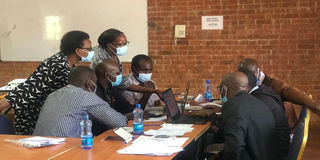Sailing to wider waters: How Kenya's coastal polytechnic is arming itself to train more seafarers
Sponsored by Kenya Coast National Polytechnic

Developing curriculums for new KCNP courses with representatives from the Curriculum Development, Accreditation and Certification Council (CDACC), Kenya Maritime Authority (KMA), and industry.
In October 2018, the World Bank and the Government of Kenya selected the Kenya Coast National Polytechnic (KCNP) to develop a Regional Flagship TVET Institute (RFTI) in Marine Transport and Port Logistics. This was through the East Africa Skills for Transformation and Regional Integration Project (EASTRIP).
The Polytechnic was among 16 Regional Flagship TVET Institutes (RFTIs) chosen from Kenya, Tanzania and Ethiopia. The other RFTIs in Kenya are Meru Polytechnic, Kisumu Polytechnic, Kenya Institute of Highways and Building Technology, and KenGen-Geothermal Training Centre.
Subsequently, KCNP is developing a marine campus in Kwale County to train personnel for the little exploited Blue Economy in East Africa. Already, the Polytechnic is procuring modern equipment for training at the campus.
Earlier, the Kenya Maritime Academy (KMA) and experts from the Curriculum Development Assessment and Certification Council (CDACC), while developing competency-based curriculums, roped in industry players and trainers to ensure the outcomes were well informed.
The courses developed include Cruise Animation levels 4 and 5, Marine Blasting level 3, Marine Fabrication and Welding level 5, Marine Painting level 4, Marine Welding level 4 and Port Logistics level 6. These will help meet the labour demands in the maritime sector.
The second phase of curriculum development started in December 2021, and the following courses are under development: Cargo Handling Operator levels 4 and 5, Marine Refrigeration and Air Conditioning Technician levels 4 and 5, Marine Plumber level 4, and Ship Cook. Currently, KCNP offers Craft Certificate course in Marine Engineering and Artisan in Seafarers.
Sending staff on industrial training
In addition, KCNP has attached 30 members of staff in industries related to marine transport and port logistics. So far, five cohorts have completed their attachment. The aim is to upskill staff in their areas of specialisation. The attachment runs for one month.
KCNP has managed to implement this initiative through the support of the experienced and seasoned EASTRIP project Industry Advisory Board (IAB). The IAB is composed of 86 percent of industry representatives from the maritime, port logistics and hospitality sectors. They offer attachment opportunities to staff or approach relevant industry players to allow KCNP staff to undertake attachment.
Furthermore, partner industries that have signed Memoranda of Understanding (MoUs) with KCNP boost the exposure of staff and students by providing attachment opportunities. The African Marine and General Engineering Company (AMGECo), Maersk, Mediterranean Shipping Company, Voyager, Travellers Beach Hotel, and Sun Fire and Safety Supplies Limited, are some of the partner institutions.
This relationship has enabled KCNP staff to experience previaling market trends in their fields. They also pick best practices in industry to implement in their departments.

Mrs Josphine Kyalo (left) and Gertrude Mutie at the Voyager Beach Hotel in Mombasa.
MoUs with industry and education institutions
KCNP has signed eight Memoranda of Understanding (MoUs) two with education institutions and six with industry players.
The Institute of Chartered Shipbrokers (ICS) and the National Institute of Transport (NIT) in Tanzania are the education institutions partnering with KCNP. The industry organisations are African Marine and General Engineering Company (AMGECo), Heritage Hotels Limited, Travellers Beach Hotel, Kenya Association of Hotel Keepers and Caterers (KAHC), Sun Fire and Safety Supplies Limited and Port Management Association of Eastern and Southern Africa (PMAESA).

Mr Peter Gakuru at the African Marine and General Engineering Company.
These partners have played a key role in providing attachment opportunities to staff and students, and offering professional advice on the development of competency-based curriculum. The industry players have also been involved in providing experts to participate in curriculum development.

KCNP signs a Memorandum of Understanding with Port Management Association of Eastern and Southern Africa (PMAESA). On the right is Anne Mbogo (Mrs), the Chief Principal, KCNP. On the left is Colonel Andrea Ciseau, Chairperson of PMAESA, Mombasa, Kenya.
Enrolling students from neighbouring countries
KCNP, being a Regional Flagship Institute in Marine Transport and Port Logistics under EASTRIP, enrols students from different parts of East Africa, in both short-term and long-term priority programmes. This helps to foster regional integration.
As a strategy for attracting students from neighbouring countries, KCNP collaborates with the Northern Corridor Transit and Transport Corporation (NCTTC) to enrol students from neighbouring countries of South Sudan, Uganda and Tanzania.

Graduation of 35 students from different countries in Eastern Africa, after a Shipping Management course.
Three trainers sent to NIT in Dar es Salaam
Early in the year, KCNP sent three trainers to National Institute of Transport (NIT) in Dar es Salaam, Tanzania, for staff exchange programme aimed at acquiring additional exposure.
The trainers, Mr Fidelis Mayende, Mr Nahashon Gichina and Mr Boniface Omariba, were privileged to train students at NIT for one month – from February 28 to March 28, 2022.
This was actualised through an MoU between KCNP and NIT, signed in June 2021 when NIT officials visited KCNP.

KCNP and NIT sign a Mutual Partnership Agreement at the KCNP Chief Principal’s Boardroom. From right to left: Mr Kevin Ochieng, KCNP EASTRIP Centre Leader; Anne Mbogo (Mrs), KCNP Chief Principal; Prof Zachariah Mganilwa, NIT Rector; and Mr Fabian Kisuka, NIT legal Officer.
At the signing ceremony, the Chief Principal KCNP Anne Mbogo (Mrs), said: “This MoU is the beginning of our strong integration with our neighbouring country Tanzania. We shall do our best to ensure we synergise on areas of mutual interests captured in this MoU for the development of our RFIs and our countries.”
After completion of the exchange programme, the trainers said the initiative had enriched them professionally.
For more information, visit the KCNP virtual office on www.kenyacoastpoly.ac.ke


